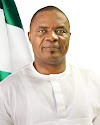Dr. Peter Mbah, a UK-trained lawyer and oil magnate, assumed Enugu’s governorship in 2023 under the PDP, pledging to transform the state through infrastructure, water access, and youth empowerment. His tenure has delivered remarkable results, earning accolades across Nigeria. These achievements include Smart Green Schools nearing completion, primary healthcare centers in all 260 wards, an 80% drop in crime, and a 400% reduction in maternal, under-five, and infant mortality rates, a 600% surge in Internally Generated Revenue, a fully booked International Conference Centre, direct flights via Enugu Air, and eco-tourism projects poised to draw 3 million visitors by 2026. Yet, the PDP’s internal fractures, factionalism, regional marginalization, and a weakened grip on the South-East as a zone have stifled his ambitions. The defection, a collective move with National Assembly members, the State House of Assembly, the State Executive Council, Local Government Chairmen and Councillors, and over 80% of party executives, responds to three imperatives: aligning with federal power for resources, neutralizing intra-party sabotage, and bolstering prospects for 2027 and beyond.
The PDP’s decline mirrors the U.S. Democratic Party’s mid-20th-century shift that alienated Reagan. Once Nigeria’s dominant force for 16 years, the PDP is now plagued by infighting and an inability to counter the APC’s narrative under President Bola Tinubu. In Enugu, clashes with some cabals, as decried by former PDP chairman Augustine Nnamani, have blocked legislative and federal synergies vital for Mbah’s agenda. The PDP’s national leadership, weakened post-2023 elections, offers little support; its opposition stance isolates Enugu in a federation where the APC controls fiscal and political levers. Scholars like Samuel Huntington note that in transitional democracies, parties often serve as elite bargaining arenas rather than ideological bastions, pushing pragmatists like Mbah to seek viable platforms. Mbah articulated this in his address: “For decades, the South-East, especially Enugu, has stood firmly behind the PDP… Yet despite this history, our voices were too often disregarded.” Like Reagan, who rejected a Democratic Party he saw as abandoning free-market principles, Mbah seeks a “fair partnership” with the APC, driven by integrity and regional equity, not resentment.
The APC, as Nigeria’s ruling party, offers Mbah what the Republican Party gave Reagan: a platform to amplify influence. Controlling federal budgets, infrastructure, appointments, and security, the APC is critical for Mbah's vision and Enugu’s agrarian, extractive, and safety opportunities. Tinubu’s recent praise for Mbah signals a deliberate courtship to strengthen the APC’s South-East foothold ahead of 2027. This mirrors Reagan’s alignment with a GOP capturing America’s conservative surge, enabling his governorship and presidency. Mbah’s move aligns with a broader PDP exodus, including Delta and Akwa Ibom’s completed switches, almost completed ones in Taraba, Bayelsa, and others, consolidating Tinubu’s coalition.
Anthony Downs’ median voter theorem tried to explain this: politicians gravitate toward the ruling coalition to maximize impact. But this does not really explain Mbah’s move. Mbah’s address explains this more: “I have found in His Excellency President Bola Ahmed Tinubu… a partner in purpose,” praising some economic reforms as “smart choices” paralleling Enugu’s strides such as the ongoing 260 Farm Estates, the CNG buses, and revived assets like Hotel Presidential and NigerCem company. Mbah’s core remains unchanged, much like Reagan’s unwavering commitment to individual liberty. Critics may differ, but his technocratic roots, from Pinnacle Oil to legal advocacy, prioritize results over dogma. The PDP’s “total collapse” in the South-East necessitated this realignment to secure Enugu’s voice in Abuja, just as Reagan’s switch positioned him to reshape California and America. Mbah’s defection will integrate the South-East into Nigeria’s national project, potentially paving the way for Igbo leadership in the near future. He addressed concerns directly: “Our Igbo DNA does not change; our destiny does not change. What changes is that our vision now finds stronger reinforcement at the federal level.” Enugu’s progress, water gains, Nigeria’s Cleanest State award, and ongoing projects, will continue.
Former governor, Sullivan Chime’s endorsement edges this as an act of visionary courage rather than betrayal, akin to Ronald Reagan’s bold leap to the GOP, a move that ultimately carried his ideals to the White House. Peter Mbah’s transition from the PDP to the APC reflects Nigeria’s fluid political landscape, where adaptability preserves vision and sustains dreams. Like Reagan, whose 1962 switch unlocked a transformative path without altering his core convictions, Mbah remains a technocrat devoted to empirical governance and equitable growth. As Enugu anticipates greater federal engagement, symbolized by Mbah’s APC membership card received in the presence of Vice President Kashim Shettima, he stands poised for a broader national role, perhaps one that could carry him to Aso Rock. Reagan’s journey from Democrat to Republican president reminds us that while party affiliations may shift, the resolve of a true statesman endures. For Ndi Enugu, as Mbah affirmed, “Tomorrow is here,” now more determined than ever.
Sullivan K. Edeani
is a Ph.D. Student in Kentucky,
United States.
















0 Comments